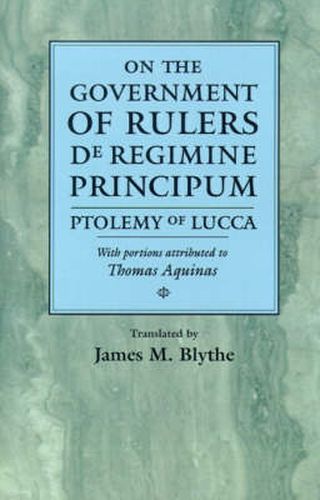Readings Newsletter
Become a Readings Member to make your shopping experience even easier.
Sign in or sign up for free!
You’re not far away from qualifying for FREE standard shipping within Australia
You’ve qualified for FREE standard shipping within Australia
The cart is loading…






Ptolemy, considered a proto-Humanist by some, combined the principles of Northern Italian republicanism with Aristotelian theory in his De Regimine Principum, a book that influenced much of the political thought of the later Middle Ages, the Renaissance, and the early modern period. He was the first to attack kingship as despotism and to draw parallels between ancient Greek models of mixed constitution and the Roman Republic, biblical rule, the Church, and medieval government.
In addition to his translation of this important and radical medieval political treatise, written around 1300, James M. Blythe includes a sixty-page introduction to the work and provides over 1200 footnotes that trace Ptolemy’s sources, explain his references, and comment on the text, the translation, the context, and the significance.
$9.00 standard shipping within Australia
FREE standard shipping within Australia for orders over $100.00
Express & International shipping calculated at checkout
Ptolemy, considered a proto-Humanist by some, combined the principles of Northern Italian republicanism with Aristotelian theory in his De Regimine Principum, a book that influenced much of the political thought of the later Middle Ages, the Renaissance, and the early modern period. He was the first to attack kingship as despotism and to draw parallels between ancient Greek models of mixed constitution and the Roman Republic, biblical rule, the Church, and medieval government.
In addition to his translation of this important and radical medieval political treatise, written around 1300, James M. Blythe includes a sixty-page introduction to the work and provides over 1200 footnotes that trace Ptolemy’s sources, explain his references, and comment on the text, the translation, the context, and the significance.